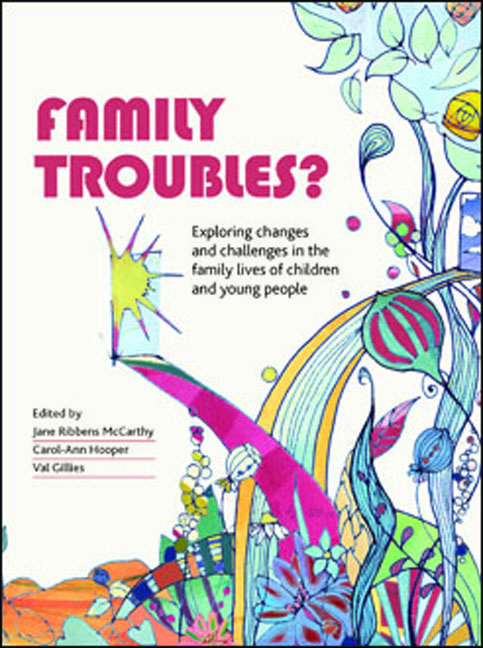Book contents
- Frontmatter
- Contents
- Notes on contributors
- Foreword
- Preface
- 1 Troubling normalities and normal family troubles: diversities, experiences and tensions
- Part One Approaching family troubles ? Contexts and methodologies :Introduction to Part One
- Part Two Whose trouble ? Conteste d definitions and practice: Introduction to Part Two
- Part Three The Normal, The Troubling And The Harmful?: Introduction to Part Three
- Part Four Troubles and transitions across space and culture: Introduction to Part Four
- Part Five Working With Families: Introduction to Part Five
- Index
20 - Estimating the prevalence of forced marriage in England
Published online by Cambridge University Press: 07 September 2022
- Frontmatter
- Contents
- Notes on contributors
- Foreword
- Preface
- 1 Troubling normalities and normal family troubles: diversities, experiences and tensions
- Part One Approaching family troubles ? Contexts and methodologies :Introduction to Part One
- Part Two Whose trouble ? Conteste d definitions and practice: Introduction to Part Two
- Part Three The Normal, The Troubling And The Harmful?: Introduction to Part Three
- Part Four Troubles and transitions across space and culture: Introduction to Part Four
- Part Five Working With Families: Introduction to Part Five
- Index
Summary
Background
A forced marriage (FM) has been defined in the UK as ‘a marriage conducted without the valid consent of both parties, where duress is a factor’ (Home Office, 2000, p 4). The Court of Appeal clarified that duress is: ‘whether the mind of the applicant has been overborne, howsoever that was caused’ (Magill and Lee, 2008, p 8). FM is therefore a marriage in which one or both spouses do not (or, in the case of some vulnerable adults, cannot) consent to the marriage and duress is involved. Duress can include physical, psychological, financial, sexual and emotional pressure. FM is therefore distinct from arranged marriage, as in an arranged marriage the family will take the lead in arranging the match but the couples have a choice as to whether to proceed.
Previous research suggests that the majority of FMs involve a young female victim, and take place among South Asian communities, such as the Pakistani, Bangladeshi and Indian communities. However, it has been shown that young men can also be victims of FM, and that FMs take place among other minority communities too, especially from Africa, the Middle East and parts of Eastern Europe (Khanum, 2008).
To develop responses to FM, we must seek to describe in full how and why family members seek to control the kinds of relationships young people make and the intimate behaviours they engage in. On the one hand, FM seeks to prevent ‘unsuitable’ relationships (eg relationships outside ethnic, cultural, religious or caste groups) or behaviours and identities (including perceived promiscuity, or being gay, lesbian, bisexual or transgender). On the other hand, it ensures ‘desirable’ alliances, such as those that are materially advantageous to the family (eg those that ensure that land, property and wealth remain within a family, or that family members from abroad can migrate to the UK as spouses). Other desirable alliances may be those that ensure care for a vulnerable parent (the young person being married into a family with the express purpose of providing care or support for elderly parents), or, indeed, to maintain the position of a vulnerable young person (eg a child with learning disabilities may be ‘married off ‘ in order to ensure their own continued care within a family).
- Type
- Chapter
- Information
- Family Troubles?Exploring Changes and Challenges in the Family Lives of Children and Young People, pp. 245 - 256Publisher: Bristol University PressPrint publication year: 2013

